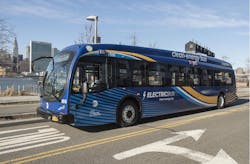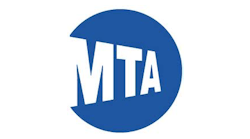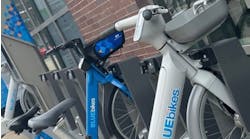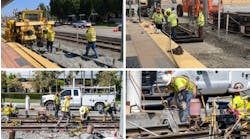Governor Cuomo Announces All-Electric Bus Pilot Program to Reduce Emissions and Modernize Public Transit Fleet
"As we overhaul and reimagine the MTA, we have an opportunity to not only modernize our bus fleet but to also reduce emissions that impact the environment and public health," Governor Cuomo said. "This new program helps the MTA secure a cleaner and greener future while leveraging the latest in innovative advancements to push New York's transit systems into the future."
In addition to testing the new electric buses, the MTA has ordered 110 new Compressed Natural Gas buses to operate across the Bronx and Brooklyn between now and the first quarter of 2019. The new buses will be the first CNG 60-foot articulated buses, and will refresh a portion of the existing fleet of 781, 40-foot CNG buses, taking the oldest buses out of service and adding capacity. CNG buses are cleaner burning and have lower particulate emissions than diesel buses.
After a study of best practices from systems across the US and around the world, the MTA identified two vendors to manufacture a total of ten all-electric buses, which were leased for test and evaluation over a period of three years in the New York City operating environment. The first of those vendors, Proterra, was selected to provide five over-night charging electric buses which will be operated on routes including the B32 in Brooklyn and Queens. The second vendor, New Flyer, will provide five buses that will be operated on the M42 and M50 routes in midtown Manhattan. All of the new electric buses will feature customer amenities such as Wi-Fi and USB ports that will enhance the customer experience.
The three-year lease for the Proterra buses includes six depot charging stations, which will be installed in the Grand Avenue Depot in Maspeth, Queens, where the buses will be recharged overnight or mid-day. The first leg of the pilot will also include one 'en-route' high power charging station, which will be located at Williamsburg Bridge Plaza in Brooklyn, and be used to extend the range of the buses by quickly recharging without having to return to the depot. The plaza is the hub for nine routes that serve Brooklyn, Manhattan and Queens.
The three-year lease for the New Flyer buses includes two depot charging stations, which will be installed in the Michael J Quill depot, Manhattan, where the buses will be recharged overnight or mid-day and to eventually support maintenance & operations type activities. The first leg of the pilot will also include two 'en-route' high power charging stations, one on East 41 Street and the second at Pier 83, Circle Line on West 43 Street. The MTA plans to learn if these two 'en-route' chargers can eventually support 24 hours of operation without having to return buses to the depot.
MTA Chairman Joseph J. Lhota said, "As a hub of business and transportation, New York City is an ideal proving ground for both electric buses and the charging technology. As we continue to modernize our public transit system, the MTA looks toward a more sustainable future by continuing to reduce greenhouse gas emissions and innovating in all of our operations."
MTA Managing Director Ronnie Hakim said, "This pilot is part of our overall mandate to modernize our bus fleet: whether it's the latest in electric vehicle technology, state-of-the-art advancements like pedestrian turn warning, traffic signal priority or advanced security systems, investing in our bus infrastructure is a top priority for the MTA."
In preparation for the pilot the MTA conducted a four-year study of global best practices for electric buses. The process included a review of reports from systems in Europe, Asia, and South America; involvement in industry groups such as the Electric Power Research Institute, the Society of Automotive Engineers and the American Public Transportation Association; in-person visits and consultations with transportation authorities in London, Geneva, Chicago, Philadelphia, Seattle, Los Angeles, and Montreal; and testing and inspections of buses from a variety of suppliers.
The pilot program is intended to provide the MTA and manufacturers of electric buses with actionable data on what works best in New York's metropolitan environment. The MTA will use the results from the pilot to refine and develop bus specifications for future electric bus procurements to ensure buses are fully able to meet the rigors of operating in New York City. As a result, the initial lease and evaluation of buses does not eliminate any other builders from future competitive procurements.
Under Governor Cuomo's direction, New York is attacking climate change by moving the transportation system from high-emission fossil fuels to electricity, provided increasingly by renewable power. Last week, the 2018 State of the State announced that the state would invest funds from the Volkswagen settlement in supporting the transition to electric mobility, including electric buses, and that it would support increasing the number of publicly-available electric vehicle charging stations to 10,000 by 2021.
New York State has the lowest per capita energy consumption and greenhouse gas emissions in the nation thanks, in part, to the fact that two-thirds of the state's residents live and work in the region served by the MTA's various properties, including the Long Island Rail Road, Metro North, and MTA buses and subways.
While the MTA produces 2.1 million metric tons of Greenhouse Gas Emissions a year, its transit operations actually reduce the emissions by 17 million metric tons annually. The MTA is the first transit agency to quantify such emissions on a regional basis, and does so as part of its ongoing mission to measure all of the benefits of public transportation.






